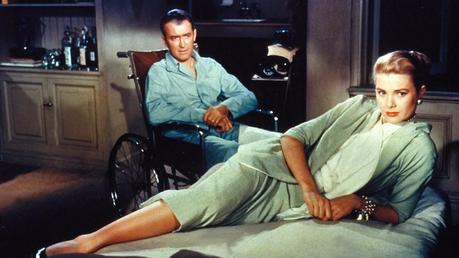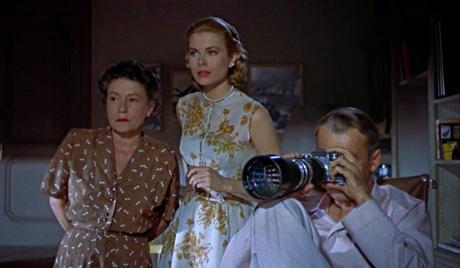 Alfred Hitchcock's Rear Window (1954) is the rare movie that appeals to everyone. Auteurists love it for showcasing Hitchcock's thematic preoccupations. Film buffs admire its faultless, innovative craftsmanship. Casual viewers like the attractive stars and thriller structure. Everyone wins.
Alfred Hitchcock's Rear Window (1954) is the rare movie that appeals to everyone. Auteurists love it for showcasing Hitchcock's thematic preoccupations. Film buffs admire its faultless, innovative craftsmanship. Casual viewers like the attractive stars and thriller structure. Everyone wins. L.B. Jeffries (James Stewart) is a photographer who broke his leg on the job. Recuperating in his sweltering apartment, he's taken to spying on his neighbors. Alongside other melodramas, he grows convinced that Lars Thorwald (Raymond Burr) murdered his invalid wife. He convinces girlfriend Lisa (Grace Kelly), though the police remain dubious. How can Jeffries prove Thorwald did it? Naturally, by sending Lisa to investigate!
Rear Window is the best expression of Hitchcock's skill. He's more impressive on a soundstage than in his larger-scale movies. Key scenes play without dialogue: the panning shot introducing the neighbors and then Jeff (via his photographs, and a close-up on his sweating face); Jeff watching Thorwald leave and return in a rainstorm; Jeff arming himself with flashbulbs as footsteps thud up the stairs. Hitchcock makes peerless use of sound and music, alongside brilliant visual details: one shot of Thorwald's apartment, dark except for a burning cigarette, is bone-chilling.
This restricted setting works better than Rope, a self-conscious experiment. Here Hitchcock creates a diverse little universe, conveyed through striking little playlets. Miss Torso (Georgine Darcy), a tarty ballet dancer, entertains hapless suitors; Miss Lonelyhearts (Judith Evelyn) contemplates suicide while a neighbor (Ross Bagdasarian) composes music. Hitchcock ties these vignettes together, these characters bonded through diegetic sound and shared space. Each story gets resolved alongside the thriller plot. Such details make Rear Window effortlessly immersive.
 Critics relish Rear Window's voyeurism, conveyed in ways obvious and subtle. John Michael Hayes' script decries our "race of peeping toms," viewing other peoples' lives as entertainment. Yet Hitchcock plays with our expectations, even here. Lisa's introduction marks her as a fetish object (that dreamy close-up!) but unlike Jeff, she can act, inserting herself into the drama. Jeff is as helpless as the viewer... or a film director watching an actress go off-script. Flashing Thorwald with camera bulbs makes a wonderfully impotent gesture: Jeff might as well use a remote control.
Critics relish Rear Window's voyeurism, conveyed in ways obvious and subtle. John Michael Hayes' script decries our "race of peeping toms," viewing other peoples' lives as entertainment. Yet Hitchcock plays with our expectations, even here. Lisa's introduction marks her as a fetish object (that dreamy close-up!) but unlike Jeff, she can act, inserting herself into the drama. Jeff is as helpless as the viewer... or a film director watching an actress go off-script. Flashing Thorwald with camera bulbs makes a wonderfully impotent gesture: Jeff might as well use a remote control.Besides direct remakes like Disturbia, Rear Window inspired a whole genre of voyeur thrillers. These movies make human perception central to the story, often distorting or subverting Hitchcock's approach. Blow-Up and The Conversation hinge on the hero misinterpreting an event, their intervention only making things worse. Michael Powell's Peeping Tom goes further, making its protagonist a serial killer. Peeping becomes not only morally dubious but destructive.
James Stewart starts off as a frustrated creep (shades of Vertigo?), but his dogged investigation overcomes any misgivings. Grace Kelly's never been better: decked out in Edith Head dresses and breaking into Thorwald's apartment, she's beautiful, brave and resourceful. Thelma Ritter (All About Eve) and Wendell Corey (The Furies) contribute snark from the sidelines. Raymond Burr is equally intimidating across the yard or five feet away.
Does anyone need to be sold on Rear Window? Few films achieve such a seamless blend of art and entertainment.

